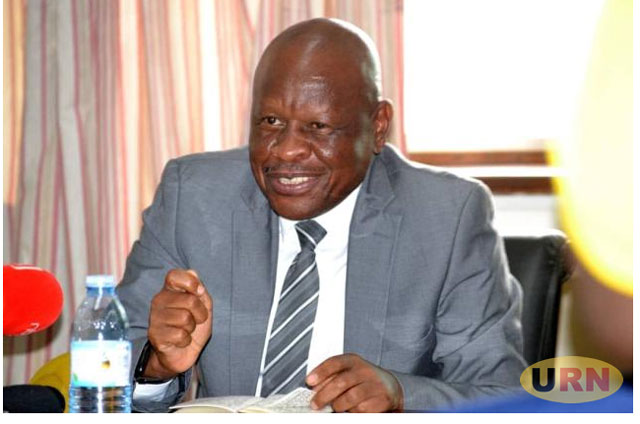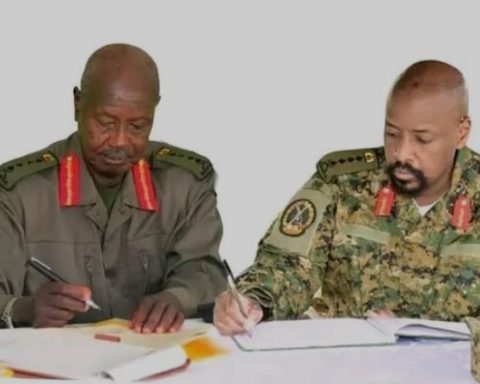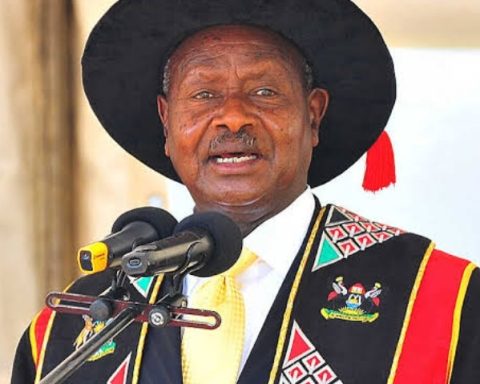General Wilson Mbadi, the newly appointed State Minister of Trade, has issued a stern warning to the Uganda National Bureau of Standards (UNBS) and the Trade Ministry staff. He made it clear that incompetence and laxity will not be tolerated under his leadership.
Gen Mbadi, who until recently served as the Commander of the Defense Forces, said that despite the vital role that the UNBS should play in maintaining market standards for both domestic and export goods, the institution seems to be trapped in corruption, disorder, and incompetence.
Mbadi was speaking on Thursday during the handover ceremony held at Farmer’s House in Kampala. General Mbadi emphasized that despite Uganda’s strides in industrialization, a concerning number of products and produce face rejection due to UNBS and the quality control department’s neglect. He stated his readiness to take swift action to rectify these issues.
Mbadi’s transition to a political role in a ministry adds to the growing number of serving officers being deployed to such positions. This move has sparked debates, with many suggesting that the President’s decision to entrust military personnel in strategic areas stems from his confidence in their ability to deliver tangible results.
General Mbadi underscored the significance of the trade ministry, highlighting its crucial role in national affairs. Despite not being deeply technical in trade and industry matters, he emphasized his understanding of the pivotal role that trade plays in ensuring security at a strategic level.
Mbadi comes into the ministry at a time, as it grapples with a myriad of challenges, including internal bickering among staff, allegations of corruption, and reported procurement irregularities within the ministry and its supervised agencies.
Daniel Richard Makayi Nangalama, the acting UNBS Director, highlighted the issue of understaffing, revealing that they were currently working with only 500 staff compared to the approved staff ceiling of 1,200. Additionally, he mentioned the challenges they faced due to inadequate funding, which hindered their ability to acquire the necessary equipment and technology for standardization.
Available information shows that to improve the services of UNBS to the Public, the agency urgently needs over 31 bilion Shillings, of which 7 billion is for staff recruitment and salary enhancement, 14 billion for the decentralization Project of UNBS Services, and 10 billion for operations(certification, standards development, verification of equipment, calibration and surveillance).
Despite these explanations, Gen Mbadi maintained his stance, expressing his concern over the various shortcomings within UNBS. The only positive aspect he acknowledged was the EU-funded project aimed at developing harmonized standards for Uganda, aligning them with those required elsewhere in East Africa.
Francis Mwebesa, the Minister of Trade, Industry, and Cooperatives, disclosed that the trade ministry is also contending with internal issues, including allegations of staff underperformance. He revealed that many of the staff present at the meeting were unfamiliar to him despite his tenure of two and a half years at the ministry. “I will be frank. This is the first meeting to attract such a number. The majority of these staff, including senior personnel, have been absent from management meetings and are rarely seen in their offices. Some claim to be working virtually” said Mwebesa.
He remarked that with General Mbadi’s new appointment, the ministry would be revitalized. Furthermore, he issued a stern warning to the staff, stating that from the next management meeting onwards, absenteeism would not be tolerated and disciplinary action would be taken.
He revealed his intention to implement a biometric clocking-in system for staff and explore the possibility of using the generated data to determine payment based on time spent on tasks.
Geraldine Ssali, the Permanent Secretary, emphasized the critical role of the trade ministry in generating a significant portion of the country’s taxes, yet the ministry faces a shortage of funding. She outlined various key areas and priorities in her speech, revealing that nearly 500 billion shillings worth of projects remain unfunded.
Mwebesa highlighted the expectation for the new minister to advocate for funding.
Ssali said that with increased liberalization and free trade, competition for market access and investment attraction has intensified, and many countries are strategically deploying specifically trained trade officers as Commercial Attaches to their Foreign Missions. She added that the trade ministry plans to deploy such attaches to key markets like the East African Community (EAC), United Arab Emirates (UAE), Europe (Brussels and Geneva), Common Market for Eastern and Southern Africa (COMESA), and West Africa (Ghana), albeit at an estimated cost of close to 10 billion shillings.
The issue of trade attaches drew the attention of Gen Mbadi, who observed that as diplomacy evolves, there is a current emphasis on economic values. He underscored the importance of trade attaches as crucial staff in every embassy.
However, he remarked that during his visits to various countries, he found Uganda’s embassies and high commissions lacking personnel dedicated to driving the economic agenda.
Mwebesa also assigned additional tasks to the minister, including resolving conflicts arising from overlapping mandates between the Ministry of Finance and Trade, as well as agencies like the Uganda Investment Authority.
He emphasized the need to prioritize resolving issues concerning the Uganda Cooperative Bank and the establishment of a statutory Chamber of Commerce.
Mwebesa noted that Uganda currently lacks this essential department, as it appears that the president fulfills the role of the country’s chamber of commerce.
Mbadi replaces Ntabazi Harriet, who was dropped in the recent reshuffle and appointed as a senior presidential advisor.
![]()



























